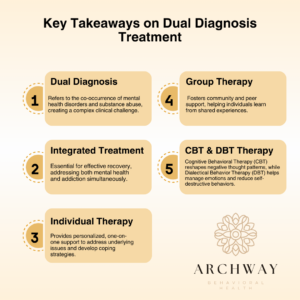Navigating the complexities of dual diagnosis—when an individual struggles with both mental health disorders and substance abuse—requires a multifaceted approach. This dual challenge often presents a unique set of obstacles, making integrated treatment essential for effective recovery. Here’s an in-depth look at how comprehensive strategies like Individual Therapy, Group Therapy, CBT Therapy, and DBT Therapy play pivotal roles in treating dual diagnosis.
Understanding Dual Diagnosis
Dual diagnosis is understood as a mix of mental health disorder or a substance abuse disorder within the individual. Conditions such as depression, anxiety, bipolar disorder, or PTSD can intertwine with dependence issues, creating a complex clinical picture. This co-occurrence not only complicates diagnosis but also impedes treatment effectiveness if not addressed holistically.
The Importance of Integrated Treatment
Integrated treatment is vital for managing dual diagnosis, as it simultaneously tackles both mental health issues and substance abuse. This approach helps break the cycle of self-medication and reinforces the need for tailored strategies that address the root causes of both conditions.
Individual Therapy: Personalized Support
Through individual therapy program one-on-one sessions, therapists build a trusting relationship with clients, allowing them to explore and confront their underlying issues.
This therapy often involves various techniques tailored to the individual’s needs, including cognitive-behavioral strategies, motivational interviewing, and more. The goal is to provide a safe space where clients can work through their personal challenges and develop coping mechanisms to manage both their mental health and dependence issues.
Group Therapy: Building Connections
While Individual therapy provides personal attention, Group therapy program offers the opportunity to connect with others who are facing similar struggles. This collective setting can be incredibly therapeutic, as it fosters a sense of community and shared experience.
In Group therapy, participants benefit from hearing others’ stories, sharing their own experiences, and receiving support from peers who understand their struggles. This environment encourages the development of social skills and can help individuals learn new coping strategies from others who have faced similar challenges.
CBT Therapy: Reshaping Thought Patterns
Cognitive Behavioral Therapy (CBT) is a widely recognized and effective approach for treating dual diagnosis. By challenging and altering dysfunctional beliefs, CBT helps individuals develop healthier ways of thinking and behaving. CBT’s structured and goal-oriented nature makes it particularly effective for addressing the intertwined issues of mental health and dependence.
DBT Therapy: Managing Emotions
Dialectical Behavior Therapy (DBT) is another valuable tool in the dual diagnosis toolkit, especially for individuals struggling with intense emotions and self-destructive behaviors. Developed initially for borderline personality disorder, DBT combines cognitive-behavioral techniques with mindfulness and acceptance strategies.
These skills help individuals manage their emotions more effectively, reduce impulsive behaviors, and improve their relationships—crucial components in both mental health treatment and recovery from dependence.
Comprehensive Treatment Planning
A successful dual diagnosis treatment plan often involves a combination of these therapeutic approaches, tailored to the individual’s unique needs. This integrated approach ensures that both mental health and dependence issues are addressed in a coordinated manner.
Treatment planning typically includes a thorough assessment to identify specific needs and challenges, followed by a customized plan that incorporates various therapies. Regular monitoring and adjustments to the plan ensure that progress is made and that any emerging issues are addressed promptly.
The Path Forward
Treating dual diagnosis requires a holistic and integrated approach that addresses the complexities of both mental health and dependence issues. Individual Therapy, Group Therapy, CBT Therapy, and DBT Therapy each play a vital role in this comprehensive treatment strategy. By combining these therapeutic methods with robust support systems, individuals can find a path to recovery that acknowledges and addresses their multifaceted struggles.
Effective dual diagnosis treatment is not a one-size-fits-all solution but a dynamic process tailored to the unique needs of each individual. Through a combination of personalized care and therapeutic strategies, those facing dual diagnosis can work towards a healthier, more balanced life, free from the grip of both mental health disorders and substance abuse.
Get Help from Archway Behavioral Health
Archway Behavioral Health Center offers a comprehensive range of mental health services to support individuals on their journey to recovery from dual diagnosis. Our experienced team is dedicated to providing compassionate and effective care.
Our Services Include:
- 1-on-1 Therapy: Personalized sessions to address specific needs and goals.
- Group Therapy: Connect with others facing similar challenges and build a support network.
- Partial Hospitalization Program: Intensive daytime treatment for comprehensive care.
- Intensive Outpatient Program: Flexible program balancing treatment with daily responsibilities.
- Medication Management: Working with psychiatrists to optimize treatment plans.
Our programs are designed to address both the mental health and substance abuse aspects of dual diagnosis, helping you achieve long-term recovery and overall well-being. Contact us today to learn more about our services and how we can help you on your path to recovery.
FAQs on Dual Diagnosis on Mental Health Treatment
What are some common mental health conditions that occur with dependence?
- Common mental health conditions that often co-occur with dependence include:
- Depression
- Anxiety
- Bipolar disorder
- Post-traumatic stress disorder (PTSD)
- Attention Deficit Hyperactivity Disorder (ADHD)
- Schizophrenia
Why is it important to treat both conditions simultaneously?
Treating both the mental health condition and the substance abuse disorder together is crucial because they often interact and worsen each other. Addressing both issues simultaneously increases the chances of long-term recovery.
What are the challenges of treating dual diagnosis?
Challenges include:
- Identifying both conditions accurately
- Coordinating treatment between mental health and dependence specialists
- Managing complex symptoms and medication interactions
- Addressing underlying trauma or other contributing factors
What types of treatment are available for dual diagnosis?
Treatment options vary depending on the severity of the conditions, but typically include:
- Medication management
- Psychotherapy (individual, group, or family)
- Substance abuse counseling
- Cognitive-behavioral therapy (CBT)
- Support groups
Can I recover from both a mental health condition and dependence?
Yes, with the right treatment and support, individuals with dual diagnosis can achieve lasting recovery.
By taking the first step toward treatment, you open the door to a more fulfilling and balanced life, free from the constraints of mental health condition. Take the step toward reclaiming your life and health—contact us at (888) 488-4103.



